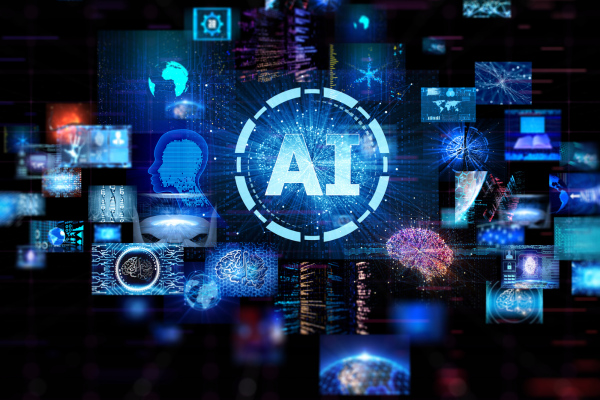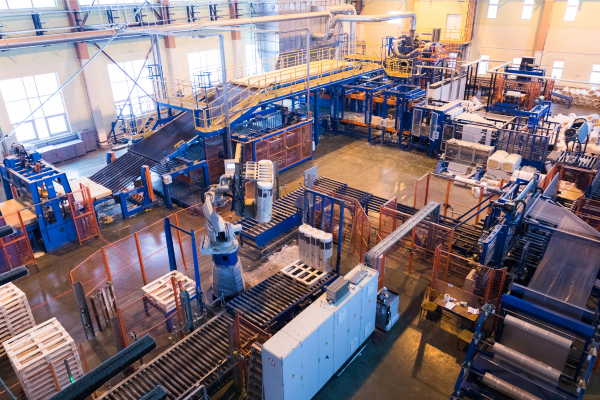Artificial intelligence (AI) has advanced significantly since its launch in the 1950s, from simple rule-based systems to powerful generative models capable of generating art, writing essays, and even detecting diseases. AI is no longer a future concept; rather, it is a transformational force that is transforming businesses, economies, and daily life. As we approach the start of an AI-driven era, it is critical to investigate how this technology will affect the future, the opportunities it offers, and the challenges it represents. Here is the future of AI in different industries:

The Evolution of AI: From Narrow to Generative Intelligence
The journey towards the development of AI began in 1951 with Christopher Strachey’s checkers-playing program, which was the first step toward machine intelligence. Over the decades, AI has developed through numerous crucial stages.
Narrow AI: Early artificial intelligence systems, such as IBM’s Deep Blue, were built to do certain jobs. While innovative, these systems lacked the ability to generalize or adapt beyond their predefined functions.
Machine and Deep Learning: The introduction of machine learning (ML) and deep learning transformed AI by allowing systems to learn from datasets. IBM Watson’s triumph in Jeopardy! in 2011 demonstrated AI’s ability to interpret natural language and complex facts.
Generative AI: In 2018, OpenAI introduced its GPT models, bringing in a new age. Generative AI can generate writing, images, music, and even code, providing unparalleled opportunities for creativity and innovation.
This progress has paved the way for AI to become a ubiquitous force, woven into almost every area of modern life.
AI’s Impact on Industries: A New Era of Innovation
Artificial intelligence is no longer a futuristic concept; it is a current reality that is reshaping industries around the world. AI is driving efficiency, innovation, and personalized experiences across industries, including healthcare and agriculture. Here’s a deeper look at how AI is revolutionizing key sectors:
1. AI in Healthcare
AI is revolutionizing healthcare by improving diagnosis, treatment, and patient care. Machine learning algorithms can find patterns and forecast results from massive volumes of medical data, including imaging scans, genetic information, and patient records. For example, AI-powered systems can diagnose diseases such as cancer early and with greater accuracy than traditional approaches.
AI is also transforming medication research by simulating chemical interactions and predicting the efficacy of new compounds, resulting in significant time and cost savings in bringing new treatments to market. Virtual nurse assistants and AI chatbots help patients 24 hours a day, seven days a week by answering queries and monitoring their health. Furthermore, robotic surgery devices assisted by AI improve precision and shorten recuperation times, making difficult surgeries safer and more accessible.

2. AI in Manufacturing
In manufacturing, AI is driving the fourth industrial revolution, also known as Industry 4.0. AI-powered robots automate repetitive operations such as assembly, welding, and packaging, increasing efficiency and decreasing human error. Predictive maintenance systems use artificial intelligence (AI) to evaluate sensor data from machines, predicting equipment breakdowns and reducing downtime.
AI is also improving quality control by utilizing computer vision to detect faults in items with more accuracy than human inspectors. Smart factories, powered by AI, optimize supply chains, reduce waste, and improve production planning. These innovations not only increase production, but also allow manufacturers to respond more swiftly to market demand.
3. AI in Finance
The financial sector is using AI to improve decision-making, improve client experiences, and reduce risks. Artificial intelligence algorithms are used to detect fraud by studying transaction patterns in real time and identifying questionable activities. In investment management, AI-powered technologies evaluate market trends and economic data to provide insights and recommendations, allowing traders to make more informed decisions.
Robo-advisors provide tailored financial advice to clients, making wealth management more accessible. AI is also helping to streamline regulatory compliance by automating audits and guaranteeing conformity to complicated financial regulations. These advancements are making financial services more efficient, secure, and customer-focused.
4. AI in Education
AI is personalizing education by tailoring learning experiences to each student’s specific needs. Intelligent tutoring systems employ machine learning to identify learning gaps and provide tailored guidance, allowing students to grasp difficult ideas at their own speed. AI-powered solutions are also automating administrative activities such as grading, allowing educators to focus on teaching and mentoring. Adaptive learning platforms are revolutionizing traditional classrooms by providing personalized lesson plans and interactive content. Mobile AI apps help students with questions, provide immediate feedback, and even offer career advice. These innovations make education more accessible and effective, closing gaps in access and quality.
5. AI In Transportation
AI has the potential to transform transportation with driverless vehicles and sophisticated traffic management systems. Self-driving cars powered by AI have the potential to reduce accidents caused by human error while also improving road safety. AI navigation systems optimize routes in real time, resulting in less traffic congestion and pollution.
AI is being utilized in public transportation to forecast passenger demand and adjust schedules, resulting in increased efficiency and shorter wait times. Logistics companies are using AI to optimize supply chains, track shipments, and anticipate delivery times more accurately. These advances make transportation safer, greener, and more efficient.

6. AI in Retail and Consumer Goods
AI is boosting the shopping experience by making personalized recommendations and streamlining inventory management. AI-powered chatbots offer instant customer service, answering questions and addressing difficulties in real time. Predictive analytics enables merchants to better estimate demand, optimize pricing, and manage supply chains.
AI is being utilized in e-commerce to produce virtual shopping assistants and augmented reality (AR) solutions that allow shoppers to see things before making a purchase. These improvements not only improve consumer pleasure, but they also increase revenue and lower operating costs.
7. AI in Agriculture
AI is revolutionizing agriculture by optimizing resource utilization and increasing yields. Drones and satellite photography, powered by AI, monitor crop health and detect problems such as pest infestations or nutrient deficits. AI-powered irrigation systems save water by delivering the appropriate amount of water at the correct time.
Farmers can use predictive analytics to anticipate weather patterns and market trends, allowing them to make better decisions. These developments are improving agriculture’s sustainability and resilience, addressing issues such as climate change and food security.
8. AI in Energy and Utilities
Artificial intelligence optimizes energy use and improves utility service efficiency. Smart grids utilize artificial intelligence to regulate supply and demand, reducing power interruptions and increasing grid resilience. AI-powered systems forecast energy usage patterns, allowing utilities to manage resources more efficiently.
AI is being utilized in renewable energy to improve the performance of solar panels and wind turbines, resulting in increased energy output and cost savings. These inventions are accelerating the shift to a more sustainable energy future.
9. AI in Media and Entertainment
AI is revolutionizing the media and entertainment industry by transforming how content is created, consumed, and personalized. From generating text and editing images to composing music and enhancing user experiences, AI is pushing the boundaries of creativity and efficiency.
- Content Creation
AI-powered technologies are expediting the creative process, allowing producers to produce high-quality material more quickly than ever before. For example, generative AI models can create articles, video scripts, and even music. Artificial intelligence is being utilized in movies and advertising to create realistic visual effects, automate editing jobs, and even build complete scenes. This not only shortens production time but also cuts expenses, making powerful creative tools more affordable to smaller studios and independent creators.
- Photo and Video Editing
Artificial intelligence is changing photo and video editing by automating complicated operations. AI is now used in tools such as Adobe Photoshop and Premiere Pro to adjust colors, remove objects, and stabilize videos. Mobile apps have also embraced AI, incorporating capabilities like as background removal, automatic enhancements, and even AI-generated artwork. A comprehensive list of the best apps for video editing can help creators locate the best software for their needs. These tools make it easy for both pros and amateurs to create polished, professional-quality material.
- Personalized User Experiences
AI-powered recommendation systems are the foundation of personalized media consumption. Artificial intelligence is used by platforms such as Netflix, Spotify, and YouTube to assess user preferences and provide tailored content suggestions. This not only increases user engagement but also allows producers to reach their intended audiences more efficiently. In gaming, artificial intelligence is being utilized to generate dynamic, adaptive tales that respond to player choices, providing a more immersive experience.
10. AI in Insurance
Artificial intelligence is streamlining the insurance sector by automating claims processing and enhancing risk assessment. AI systems examine data to forecast policyholder behavior and detect probable fraud, lowering the time required to settle claims. Chatbots and virtual assistants improve customer service by offering immediate assistance and personalized recommendations. These advancements are making insurance services more efficient, transparent, and user-friendly.
11. AI in Security and Surveillance
AI improves security systems by evaluating video feeds for questionable activities. Facial recognition technology is used in surveillance to identify individuals, hence increasing public safety. AI-powered cybersecurity products safeguard sensitive data by identifying and mitigating threats in real time.
These developments make security systems more proactive and effective in combating both physical and digital threats.
The Future of AI: What Lies Ahead?
As AI evolves, several trends will shape its future:
Increased Automation: Artificial intelligence will automate routine jobs across businesses, allowing humans to focus on creative and strategic work. This could result in tremendous productivity improvements.
Ethical AI Development: The push for ethical AI will grow, with corporations adopting frameworks to assure justice, transparency, and accountability in AI systems.
AI in Scientific Discovery: By analyzing complicated datasets and discovering patterns that people may overlook, AI has the potential to speed breakthroughs in sectors such as medicine, climate science, and renewable energy.
Conversational AI: Advanced chatbots and virtual assistants will become more sophisticated, allowing for seamless human-machine interactions in customer service, healthcare, and beyond.
Quantum AI: The combination of quantum computing and artificial intelligence has the potential to transform industries such as encryption, financial modeling, and drug development by addressing previously intractable issues.
Conclusion: Embracing the AI Revolution Responsibly
The future of artificial intelligence is both thrilling and uncertain. While technology has enormous potential to alleviate some of humanity’s most pressing problems, it also necessitates careful oversight to mitigate its perils. As we navigate this revolutionary era, we must prioritize ethical issues, engage in education and reskilling, and encourage cross-sector collaboration.
By wisely embracing AI, we can harness its potential to make the world more innovative, efficient, and equitable. The future is determined not only by what AI can achieve, but also by how humans choose to use it. Together, we can design a future in which AI is a positive force, propelling progress and improving people’s lives all over the world.





